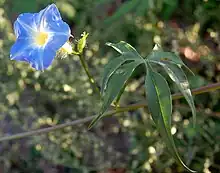Ipomoea barbatisepala
Ipomoea barbatisepala, commonly known as canyon morning glory,[1] is a species of morning glory. It is native to the Southwestern United States, where it has been found in New Mexico and Arizona;[2] in these regions, its native range overlaps with the non-native range of the closely related Ipomoea hederacea.[3] It is also found in the west of Mexico.[4]
| Ipomoea barbatisepala | |
|---|---|
 | |
| Flowers, buds, and leaves | |
| Scientific classification | |
| Kingdom: | Plantae |
| Clade: | Tracheophytes |
| Clade: | Angiosperms |
| Clade: | Eudicots |
| Clade: | Asterids |
| Order: | Solanales |
| Family: | Convolvulaceae |
| Genus: | Ipomoea |
| Species: | I. barbatisepala |
| Binomial name | |
| Ipomoea barbatisepala | |
Description
The leaves are glabrous and deeply lobed, alternating on the stem.[5] The flowers are blue or rarely white with a yellow center,[5][6] usually appearing on the plant from July to December.[2] The fruit is a capsule containing several dark seeds. The plant can be distinguished from the similar Ipomoea hederacea and Ipomoea cardiophylla by the leaf shape; while I. cardiophylla has heart-shaped leaves[7] and I. hederacea has three-pointed leaves,[8] I. barbatisepala has multi-lobed leaves.[5]
References
- "Ipomoea barbatisepala A.Gray". www.gbif.org. Retrieved 2021-11-27.
- "Ipomoea barbatisepala, Canyon Morning-glory, Southwest Desert Flora". southwestdesertflora.com. Retrieved 2021-11-27.
- "Ipomoea hederacea | CLIMBERS". Retrieved 2021-11-27.
- "Ipomoea barbatisepala A.Gray | Plants of the World Online | Kew Science". Plants of the World Online. Retrieved 27 November 2021.
- "SEINet Portal Network - Ipomoea barbatisepala". swbiodiversity.org. Retrieved 2021-11-27.
- "Canyon Morning Glory (Ipomoea barbatisepala)". www.fs.fed.us. Retrieved 2021-11-27.
- "SEINet Portal Network - Ipomoea cardiophylla". swbiodiversity.org. Retrieved 2021-11-27.
- "SEINet Portal Network - Ipomoea hederacea". swbiodiversity.org. Retrieved 2021-11-27.